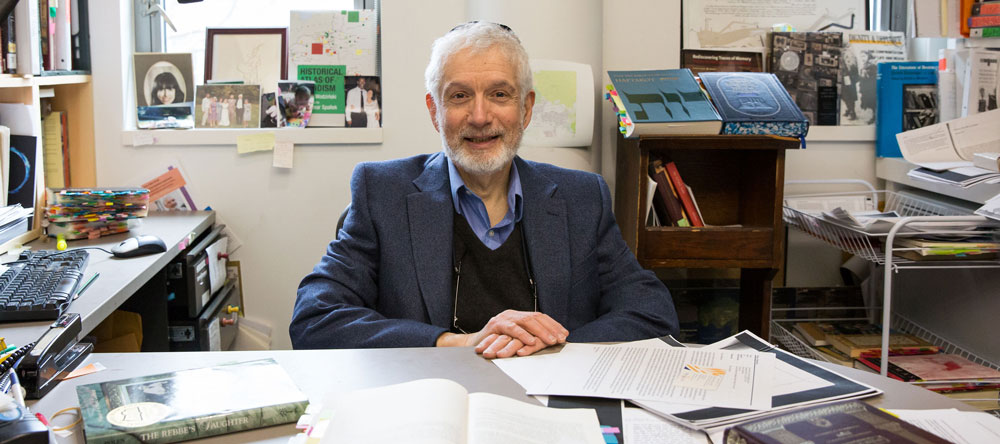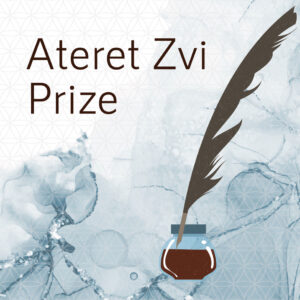Faculty Faculty Spotlight: Rabbi Nehemia Polen

As part of our new faculty spotlight series, we recently spoke with Hebrew College faculty member Rabbi Nehemia Polen about his teaching, research, and recent Hadar’s Ateret Tzvi essay award.
Q. What do you like best about teaching at Hebrew College and particularly teaching rabbinical students?
Hebrew College provides an open, vibrant environment for learning and religious exploration that is focused yet expansive, embracive of diversity while deeply immersed in the granular specificity of the Judaic tradition. We emphasize study of classical texts and at the same time focus on prayer, spiritual formation and inner growth. With this combination of panoramic vision together with laser-like, deep concentration, Hebrew College is nearly unique in today’s landscape. What a delight it is to be here!
Q. How have Hebrew College students inspired you?
It is genuinely inspiring to see our students’ devotion to Torah. Ours is a full-time, residence program that involves a five-year (often six-year) commitment, calling upon enormous resources of time and energy, along with familial and financial arrangements—a transformative period of total immersion that students undertake with joy and enthusiasm.
Q. What is your specialty and why did you choose it?
When I first came to Hebrew College, my specialty was Kabbalah and Hasidism—the Jewish mystical tradition. While I continue to teach these areas, in recent years I have developed another focus—Hebrew Bible and the book of Leviticus in particular. Many people find Leviticus difficult and opaque, and there is particular excitement in bringing out the elegance, wisdom and relevance of this key biblical book.
Q. Tell me about the Hadar’s Ateret Tzvi essay award you just won?

The essay is called “Nehemiah son of Hacaliah learns from Moses and Aaron” and is available on the Hadar website.
Q. What is a text you love to teach and why?
As mentioned above, I love Leviticus because it is a text that is often neglected and marginalized. There is great joy in revealing its hidden treasures and contemporary lessons. I teach Leviticus as a guidebook for gift-giving, for cultivating and enhancing relationships of all kinds—worldly as well as spiritual.
Q. What is a text you love that is unrelated to teaching rabbinical students?
Ultimately everything is interrelated! But at least initially, teaching Mishnah is not in my portfolio, especially Mishnah Tohorot—Purities. Similar to Leviticus, I am enchanted by the logic, elegance and wisdom that the Rabbis bring to their analysis of everyday objects, their categorizations and transformations.
Q. Outside of teaching, what is something you love about Judaism?
Judaism is embodied, this-worldly. It gives us the rhythms of life with its sacred times, and a topography of sacred space whose holiness radiates to the entire world. Its capstone is the gift of Shabbat—the holy day that makes the entire week smile and overflow with blessing.
Q. A rabbinical school teacher can play multiple roles. How would you describe your role in a few words?
I am privileged to share sacred texts—bringing ancient words alive and bringing sparkle to the eyes and hearts of new readers.
A leading expert in Hasidism, Rabbi Nehemia Polen is Professor of Jewish Thought at the Rabbinical School of Hebrew College. He is a widely published author. His books include Stop, Look, Listen: Creating Shabbos through a Spiritual Lens, The Holy Fire: The Teachings of Rabbi Kalonymus Kalman Shapira, the Rebbe of the Warsaw Ghetto; a translation of Malkah Shapiro’s The Rebbe’s Daughter: Memoir of a Hasidic Childhood, a project that originated in Polen’s research as a National Endowment for the Humanities fellow, and a recipient of a National Jewish Book Award.

